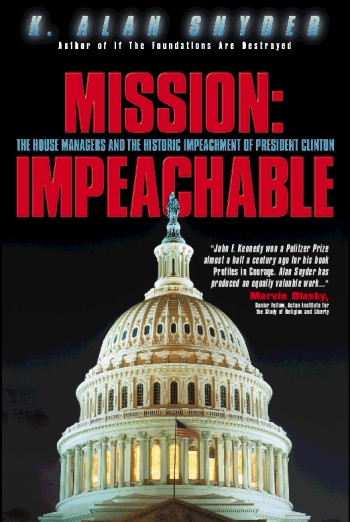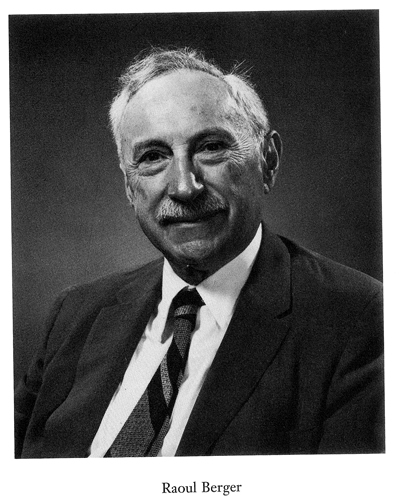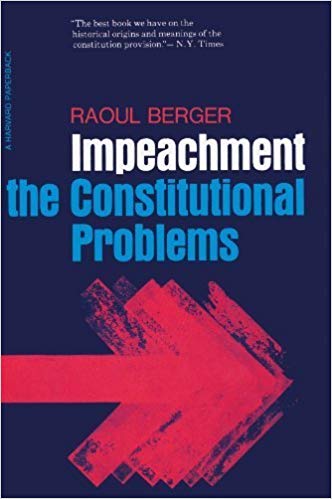
In my last post, I drew from my book, Mission: Impeachable, on whether an impeachment and removal from office required the violation of a specific law. I quoted Supreme Court Justice Joseph Story (served 1812-1845) who, in his Familiar Exposition of the Constitution, noted that the history of impeachment, both in theory and in practice, had never laid down such a requirement.
Story was the most eminent constitutional commentator of his day, and his view needs to be taken seriously. Too often today, we simply assert that if a law hasn’t been broken, there is no basis for removal from office. Yet that has never been the case.

Constitutional scholar Raoul Berger lends support to Story’s conclusion. Berger, in the 1970s, was the Charles Warren Senior Fellow in American Legal History at Harvard’s School of Law. He was one of the leading critics of the idea pushed by the Nixon administration that “executive privilege” allowed the president to withhold information from Congress. In Nixon’s case, it had to do with those Oval Office tape recordings that the Supreme Court ultimately ruled he had to turn over to the House of Representatives as it conducted its impeachment inquiry. What Nixon attempted to do has been replicated by President Trump, who has categorically denied to the House all documents from the executive branch, along with all witnesses.
In his book Impeachment: The Constitutional Problems, Berger notes that the phrase “high crimes and misdemeanors” first appears in English history, not in criminal law, but in an impeachment. He writes, “Impeachment itself was conceived because the objects of impeachment, for one reason or another, were beyond the reach of ordinary criminal redress.” He concludes that impeachment was a political, not criminal, weapon. High crimes and misdemeanors were, therefore, “a category of political crimes against the state.”

The phrase never did find its way into the criminal law of England. Sir William Blackstone, writing during the American revolutionary era, considered a high misdemeanor principally as maladministration by public officials, unrelated to statutable crimes. He even reasoned that treason and bribery were political crimes, rather than statutable, primarily because they were offenses against the State, tied closely to corrupt administration of the State. Alexander Hamilton, in Federalist #65, echoed Blackstone’s view of the political nature of impeachable acts.

Berger also noted that James Wilson, signer of the Declaration of Independence and the Constitution, and one of the first associate justices on the Supreme Court, clearly drew a line between impeachable offenses and violations of statutes, stating, “Impeachments . . . come not . . . within the sphere of ordinary jurisprudence. They are founded on different principles, are governed by different maxims, and are directed to different objects; for this reason, the trial and punishment of an offense on impeachment is no bar to a trial of the same offense at common law.” Berger concludes,
In sum, “high crimes and misdemeanors” appear to be words of art confined to impeachments, without roots in the ordinary criminal law and which, so far as I could discover, had no relation to whether an indictment would lie in the particular circumstances. . . .
What lends a “peculiar” quality to these crimes is the fact that they are not encompassed by criminal statutes or, for that matter, by the common law cases.
The current impeachment trial of Donald Trump rests not only on his violation of law by withholding congressionally approved aid to Ukraine, but also on his actions that are not connected to a specific law being broken: his attempt to have a foreign nation investigate a political rival; that nation receiving aid only after acceding to his demand for an investigation; his blanket assertion of executive privilege that blocks all documents and witnesses necessary for a valid congressional inquiry.
For all these reasons, he deserves the impeachment he already has received. For all these reasons—and because they surpass anything Richard Nixon did—he deserves to be removed from office.
More on this in my next installment.
